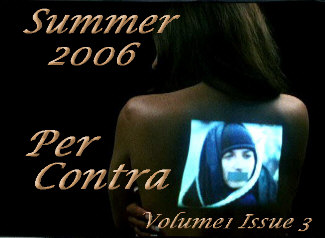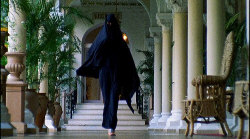


Deeyah's Music: An Interview with Steven Nevets
Her music is bursting with stone cold passion and it is this same intensity she exhibits in talking about her own place in the music kingdom. She is a Muslim woman (parents born in Afghanistan) with a forward-looking mind, a bright and sophisticated rebel who sees a wrong, identifies it, and rails against it. For this, she has been ostracized and threatened. But she knows what she wants and how to go about getting it.
Here is the extraordinary tale of a brave new girl not afraid to shed the birkah for the bikini.
Well, you know what? Iíve been working on the record for the last couple of years and Iím actually scrapping most of it. I was kind of under the illusion, I guess, that times had changed and I had changed and things were going to be different. My past troubles were not really going to be haunting me again. In my mind, thatís kind of where I was. But obviously that wasnít the case at all. And yes, youíre asking, ďIs it worth it? Is it worth doing music or continuing on this path?Ē Yes, it very much is. For a second, I thought it wasnít because when I left London early last year, I actually thought I was going to quit. Actually, I felt like I had to make a decision of what I wanted to do with my life. I could either quit what I have done since I was seven years old and that to me is probably the only way Iím going to be left alone, or I can continue and I can do something that Iíve never done, which is actually accepting that this is going on and actually address it and maybe talk about some of it through the music, because Iíve actually always avoided this.
Oh, absolutely. Because this was something very scary. This was something that was almost like a curse. Eventually people get used to me or get over it or somebody else was going to come along and I would stop getting as much shit as Iím getting.
Sense or not, will this new album feed you in such a way as to make these sacrifices endurable?
Is it worth it? You know, I donít know. The thing is, this has become so personal for me that Iím kind of getting at the point where I donít really care if this is what people want or not. Itís something I have to do for myself. If only 10 people end up hearing it and they hate it, then fine. Thatís fine. But I need to do something about this for my own sake. To basically overcome the fears that have been instilled in me pretty much my entire life.
I actually used to play the piano. I started off when I was quite young and learned a little bit about Western classical music. I played for a few years and then stopped for some reason and never really picked it back up. Thatís one of the things that I regret the most is the fact that I canít play anything. And in terms of going about writing or a certain process, Iíve been very lucky. Iíve had the chance to work with a lot of different people, writers and producers.
One of the things Iíve actually struggled with the most is English Ė is actually learning it because English is not my first language. So thatís one of the things that I actually end up getting the most help with in terms of, I know exactly what I want to say, but sometimes I struggle with how do I want say it and how will it make sense in the English language.
Other than that, I would say that the music and the melody is the most comfortable and easy for me. In terms of that, most of the stuff that I have done, it has been all kinds of different ways. Itís been everything from sitting down with somebody with an electric guitar or a piano and just starting with humming, coming up with melodies. Other times, itís just been working out a lyrical concept first and then building the song around that. And the third way I guess has been Ė and this is more because of some of the R&B-type, hip-hop-type people that Iíve worked with, which is they are very beat driven and very track driven Ė itís been like, ďHere you go. Itís a track, now take that home and go write something.Ē Which has been quite fun as well.
Yeah, heís definitely been a key. Heís actually known me for quite a while now. I was introduced to him by my previous manager, a guy called Steven Fargnoli. He used to manage Prince. When I started working with him, he spent a lot of time in Atlanta. He was like, ďListen, thereís a lot of things going on here. Thereís a lot of unknown people as well that are very, very, very good. And you might want to come over here (from England) and just play around a little bit. Maybe set something up with some of these people.Ē I ended up coming to Atlanta and one of the people that I started working with was Darin. I was working with a few other people as well, but Darin seemed to be the one that basically didnít limit me in a way that other people that I worked with in the past did. Because even though a lot of the work he had done was a lot of R&B and hip-hop, his love was not that. His love was rock.
So when I started working with Darin, he was not about, ďIím a producer. This is my sound. Now you need to sing on that.Ē He was more a producer in the traditional and more old school sense of a producer, which is, ďOkay, youíre the artist. This is what youíre about, now let me try and give you the room to do what you need to do and also try and push you as hard as I can push you. And try to make you and what you want to do as good as it can be.Ē
And actually, thereís going to be more of that. Musically, there are R&B and hip-hop influences there, but thereís actually not as much as people think. This is where music videos come in and play a role in how you are perceived as an artist. Even if you sound one way, if you look a certain way, suddenly it feels different to people. Because of some of the videos Iíve done, they feel more R&B and hip-hop. But if you separate that from the music, I donít sound like Ciara or some of the main kind of female R&B artists right now. I guess thatís helped set the tone wrong in some ways.
A huge fan. My musical background is actually in Indian classical music. I didnít even sing in English until I was 16, 17 years old. I mean Iíve grown up with MTV, but I never did anything like that myself. People always think Iím on crack when I say this, but this is the truth. Basically, Indian classical music and metal have a lot in common. They have a lot more in common than people think. A lot of the scales that metal guys use are Indian scales. And also the intricate ways that they actually play things is very Indian. Musically, itís not very far away from the music that Iím into myself. So I appreciate it and I like it. In fact, at some point in my life I can get with people who musically understand the connection, I would love to do something about it. Even if itís on more of a fusion level, because I canít scream or necessarily sing in the way that these guys sing. But musically, especially the guitar players with the riffs and how they play things, itís very, very similar. And thatís why from a very young age, the minute I heard bands like Metallica I was like, ďOh, shit! Wow, this makes sense. This actually makes sense to me.Ē And I was a kid, I was little. I was 10 or 12 years old and I remember all my girlfriends were like, ďEw, thatís creepy! Is that satan?Ē I was like, ďFuck off! Iím talking about the music. I like it. Thatís it. I donít have to be all dressed in black or whatever you think I need to be in order to like it.Ē - Interview Continues